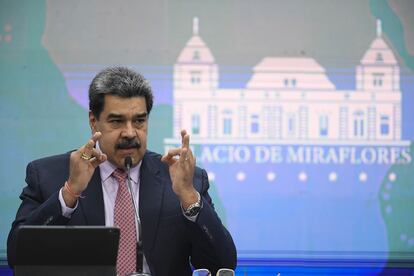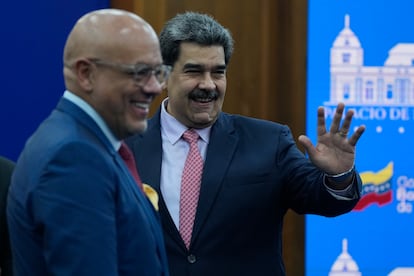Venezuela’s Maduro says free elections only possible if all international sanctions are lifted
The Chavista president clearly stated his demands for making progress at ongoing talks with the opposition in Mexico

Venezuela’s president, Nicolás Maduro, lay his cards on the table on Wednesday, clearly stating that holding free elections in 2024 would depend on whether international sanctions are lifted. “If you want free elections, we want sanctions-free elections. Therein lies the dilemma, for all of them to be lifted so that we can go to free, fresh elections in a time period to be determined by the National Electoral Council and the Constitution,” said Maduro at a meeting with foreign correspondents in Caracas.
Maduro had summoned reporters to Miraflores Palace to discuss his government’s return to the negotiating table with the opposition in Mexico, where the main goal is to set a date for elections and ensure that these can be independently verified by the international community. The government only agreed to resume talks, which had been suspended a year ago, after both sides agreed to request the unfreezing of state funds held abroad and worth around $3 billion.
At the news conference, Maduro claimed that international sanctions are to blame for the Venezuelan crisis of these last few years, and failed to assign any responsibility to his own government. The Chavista administration has been using this argument for years to justify its hold on power. Maduro said he was very happy that foreign banks would be releasing funds to address the humanitarian crisis that has forced several million Venezuelans to migrate.
“It is an agreement that has very important components of a social nature for the life of Venezuela, and the essence lies in the recovery of more than $3 billion that have been retained, frozen and kidnapped in bank accounts in the United States and Europe and which belongs to Venezuelans,” he said. “We are negotiating with the representatives of the kidnappers, with the kidnappers’ envoys, and an agreement has been signed with the representatives of the kidnappers for Venezuela’s money to be invested in the country.”
The Venezuelan leader argued that about 600 sanctions are weighing down the national economy and “specifically impact the oil and productive sector.” He blamed the crisis on “the coup mongering, interventionist, terrorist and pro-gringo right-wingers” who allegedly make up the Venezuelan opposition.
The opposition wants presidential elections to be held in 2024 with international oversight and guarantees that they will be free and fair. To try to defeat Maduro, the opposition will hold primaries to come up with a single candidate and launch a common front against Chavismo, which currently controls the Venezuelan institutions. Opposition leaders maintain that Maduro was fraudulently re-elected in 2018, which later gave rise to the interim government of Juan Guaidó, initially recognized by several countries including the United States but increasingly isolated in recent months.
Guaidó appeared to be Maduro’s main political rival, but the unity of the opposition has cracked. Several members of the delegation representing the opposition in Mexico have visible differences of opinion with Guiadó's political strategy, and believe the time has come to put an end to this parallel government and try to defeat Chavismo on its own ground. In some circles, there is speculation that the rest of the opposition parties will not ratify Guaidó in office.

Maduro’s strong man in the government is Jorge Rodríguez, president of the National Assembly and head of the Chavista delegation in Mexico. On Wednesday, Rodríguez insisted that Guaidó's parallel government has no legitimacy. Only a year ago, the Maduro administration was still isolated and facing serious financing problems due to the country’s economic crisis and international sanctions. There were no communication channels with the US.
But everything has changed in just a few months. Washington approached Chavismo, seeking alternative energy sources to the Russian ones, as the war in Ukraine created an energy crunch. Meanwhile, Colombia’s new leftist president, Gustavo Petro, insists that Venezuela should be brought back into the fold of regional organizations, and both French President Emmanuel Macron and US President Joe Biden have proposed working to unblock the Venezuelan situation.
For now, Chavismo has agreed to negotiate with the opposition in exchange for a significant amount of money that will come from abroad. Maduro himself is now demanding that all sanctions be lifted so that free elections can be held. The US and Europe, the main supporters of sanctions, will now have to assess whether Maduro truly desires these elections to be competitive.
Sign up for our weekly newsletter to get more English-language news coverage from EL PAÍS USA Edition
Tu suscripción se está usando en otro dispositivo
¿Quieres añadir otro usuario a tu suscripción?
Si continúas leyendo en este dispositivo, no se podrá leer en el otro.
FlechaTu suscripción se está usando en otro dispositivo y solo puedes acceder a EL PAÍS desde un dispositivo a la vez.
Si quieres compartir tu cuenta, cambia tu suscripción a la modalidad Premium, así podrás añadir otro usuario. Cada uno accederá con su propia cuenta de email, lo que os permitirá personalizar vuestra experiencia en EL PAÍS.
¿Tienes una suscripción de empresa? Accede aquí para contratar más cuentas.
En el caso de no saber quién está usando tu cuenta, te recomendamos cambiar tu contraseña aquí.
Si decides continuar compartiendo tu cuenta, este mensaje se mostrará en tu dispositivo y en el de la otra persona que está usando tu cuenta de forma indefinida, afectando a tu experiencia de lectura. Puedes consultar aquí los términos y condiciones de la suscripción digital.








































